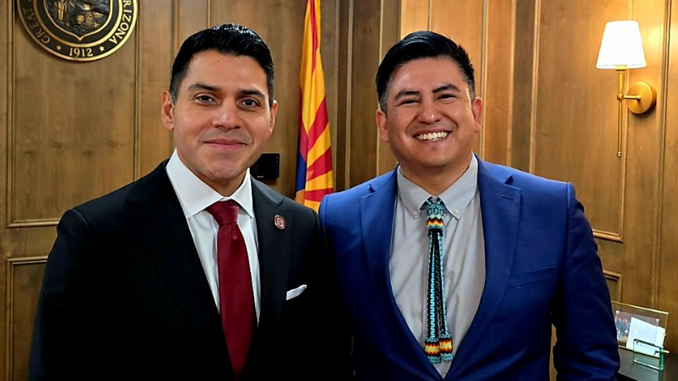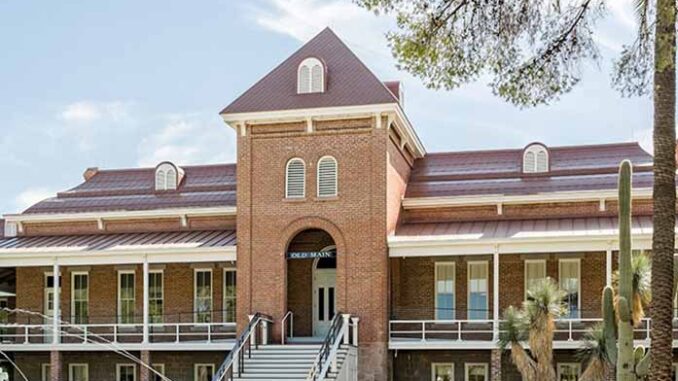
by Staff Reporter | Feb 16, 2026 | Education, News
By Staff Reporter |
The lone conservative voice for the Phoenix Union High School District (PXU) governing board resigned on Friday.
Jeremiah Cota blamed “unfounded and baseless attacks” by the rest of the board against him for his resignation. Cota said the district suffered “gross maladministration and injurious governance” and a “fiscally unsustainable path” under the rest of the board.
“I have been stunned to see how this board and district have engaged in a pattern of harassment and discrimination against fellow community and board members, including the baseless and unfounded accusations against myself,” said Cota. “As an enrolled member of the federally recognized San Carlos Apache Tribe, the outright persecution I have experienced as a board member from other members and direct personnel have jilted my relationships, caused damage and irrefutable harm, and created a toxic operating environment for both personal and professional endeavors.”
Cota was appointed to the board in June by the Maricopa County School Superintendent. Prior to his appointment, Cota worked for Reps. Paul Gosar and Andy Biggs.
Since being on the board, Cota has called public attention to a number of causes for concern within the district: increased violence following rejection of campus officers and contracts with left-wing activist groups, to name a few.
Last fall, the board was hit with significant budget reductions and staff layoffs over the steep decline in enrollment. District leadership, apart from Cota, blamed school choice and Republicans for their budget shortfalls.
Activists launched a campaign for his removal over his attendance at a Christmas party with fellow conservatives following Turning Point USA’s annual AmericaFest in December.
Secular AZ organized a petition that began circulating last month calling for Cota’s resignation, picked up by local media. Over 600 people signed the petition. Secular AZ also created social graphics to complement their campaign against Cota.
Board President Francisco Pastor-Rivera signaled support for the petition in interviews.
“As a board member, you represent making decisions that impact a student’s future. I think this attendance itself, and this action shows true colors all together,” said Pastor-Rivera. “I really question if a person is representing the values of the community that they serve.”
Cota inspired the ire of district leadership about a month after joining the board when he declined to recite a land acknowledgment statement, instead offering a prayer to God. Cota later went a step further and requested to remove the land acknowledgement statement entirely.
The board parliamentarian prevented Cota from finishing his prayer and told him that religious prayer could not occur before the land acknowledgment statement.
The denial of Cota’s commitment to a public display of his Christian faith spurred a legislative response in the form of House Bill 2110.
One of the leaders of Secular AZ and repeat political candidate for various offices, Jeanne Casteen, accused Cota of indoctrination in media interviews.
“They shouldn’t have been praying in the first place. If you want to pray, you can do it before the meeting and silently,” said Casteen.
More recently, Cota led the lone charge on the board to take disciplinary measures against staff who participated in anti-ICE protests on campus.
AZ Free News is your #1 source for Arizona news and politics. You can send us news tips using this link.

by Staff Reporter | Feb 13, 2026 | Education, News
By Staff Reporter |
New email records reveal the University of Arizona (U of A) misled the public about a donation from Jeffrey Epstein.
Email records first reported on by FOIAzona proved Epstein’s donation was not “anonymous” as U of A’s vice president for communications at the time, Chris Sigurdson, claimed. U of A’s associate vice president of external communications at the time, Pam Scott, also claimed that the university had no knowledge because Epstein was not listed on the board of directors with the charity through which he donated, Gratitude America.
“At the time the donation was made by Gratitude America Ltd., Jeffrey Epstein was not listed on the board of directors and the university was unaware of his involvement,” she said. “We have no plans to repay this contribution.”
However, records reveal Epstein’s name was postmarked on the mailing documents containing the donation check bearing his charity’s name. The donation was made out to the University of Arizona Foundation.
Epstein’s $50,000 donation was made at the request of one U of A professor, Stuart Hameroff.
Hameroff’s team also helped Epstein’s team on where to send the donation. The university, through that professor’s program, gave Epstein’s charity public recognition for the donation.
In March 2017, Hameroff asked Epstein to fund an annual conference he put on through the interdisciplinary entity he founded over 30 years ago, the Center for Consciousness Studies. These conferences have occurred since 1994.
One of the center’s latest major donations was $2 million from a retired Google software developer. These funds align with the purpose of the funds put forth by Epstein: engineering consciousness. (The latest Epstein files release revealed Epstein sought, among his other endeavors into transhumanism, to create a behavioral engineering institute at Stanford University).
Hameroff is a leader with the U of A sciences: he cofounded and chairs the Center for Consciousness Studies, cochairs the Science of Consciousness, and serves as professor emeritus of the Departments of Anesthesiology and Psychology.
Hameroff didn’t need to provide Epstein with details before the financier pledged a minimum sponsorship of $50,000.
“Who are the speakers and what is the cost?” wrote Epstein. “I’m in for at least $50,000, before knowing anything.”
Epstein’s trust in Hameroff likely stemmed from the personal relationship the pair shared. The Epstein library presently returns multiple records mentioning Hameroff from 2016 through 2018.
Hameroff stayed at one of Epstein’s apartments in New York for multiple days leading up to Halloween in 2016, arranged by Gino Yu, associate professor and director of game development at Hong Kong Polytechnic Institute. Yu referred to Epstein as his “benefactor,” per Hameroff.
Hameroff called the night “memorable” in an email after the fact.
“We appreciate you staying up late with an early flight. We were tired too, but it was a memorable night,” wrote Hameroff.
Yu also wanted James Tagg, an inventor and engineer with Penrose Institute, to attend the October 2016 meeting with Epstein and Hameroff. It’s unclear if Tagg attended. However, Hameroff did later ask Epstein to provide seed money for another project, the Penrose Institute, in May 2017 during discussions of the Center for Consciousness Studies conference.
Other recently released Epstein records revealed that an investment banker and fellow Epstein affiliate, Robert Lawrence Kuhn, directed Epstein to review another consciousness program advised by Hameroff, the Shanghai Science of Consciousness Program. That email exchange took place in February 2017. It appears that program was a reference to a canceled attempt to hold the Center for Consciousness Studies conference in Shanghai, per emails.
“Attached is the Shanghai Science of Consciousness program (Stuart Hameroff put together; I advised),” said Kuhn.
Epstein, via his charity Gratitude America, was featured as a sponsor that “made the conference a reality” per program documents. Emails affirmed this promotion, as well as offers to pay for a hotel room for Epstein’s attendance at the conference.
Another U of A faculty member and famed political activist, Noam Chomsky, was a friend of Epstein as well. Chomsky was included in Epstein’s “little black book.”
AZ Free News is your #1 source for Arizona news and politics. You can send us news tips using this link.

by Staff Reporter | Feb 13, 2026 | Education, News
By Staff Reporter |
Arizona Superintendent of Public Instruction Tom Horne believes the new federal guidance on prayer in schools serves as a pathway to further purge K-12 of diversity, equity, and inclusion (DEI).
Horne said the administration’s characterization of speech compulsion made it clear that DEI presented an impermissible threat to religious freedoms.
“The new guidance issued by the U.S. Department of Education states that ‘No public school, teacher, or school official should ever coerce or press a student to engage in speech or affirm a viewpoint that would violate the student’s sincere religious beliefs,’” said Horne. “Numerous DEI precepts violate widespread religious beliefs, such as urging students to change genders, age-inappropriate sexual lessons, and other elements that may demean a student’s religious beliefs.”
Horne clarified that the new guidance doesn’t permit schools to coerce religious expression, either. Both the superintendent and the guidance cited the 2025 Supreme Court decision, Mahmoud v. Taylor, which found that public schools mandating curriculums endorsing homosexuality and transgenderism were violating religious freedom.
“No public school, teacher, or school official should ever coerce or pressure a student to engage in speech or affirm a viewpoint that would violate the student’s sincere religious beliefs,” stated the guidance. “[A] public school cannot require a student group to adopt a particular viewpoint in order to be recognized by the school if the viewpoint violates the student members’ religious beliefs. School officials also cannot express hostility toward religious student groups by demeaning their beliefs.”
The guidance, issued last week, addresses the issue of DEI elements in the context of requirements under federal law to advise on constitutionally protected prayer in public elementary and secondary schools. This updated version replaces the last guidance issued under the Biden administration in 2023.
Horne offered a marked copy of the guidance highlighting key new provisions across the four parts of the nine-page guidance.
In order to receive federal funding, local education agencies (LEAs) must certify in writing to the Arizona Department of Education (AZED) by Oct. 1 every year that none of their policies prevent or otherwise deny participation in constitutionally protected prayer in public K-12 schools.
AZED will establish processes by which the LEAs provide that certification and by which complaints may be filed against noncompliant LEAs. AZED must also send a list of noncompliant LEAs to the Department of Education by Nov. 1.
Presently, AZED requires LEAs to answer on Critical Race Theory and DEI as part of public reporting of school grades to assist with parental choice in schools.
“We will add this question to our list and report answers not only on our website, but also, as required, to the federal government,” said Horne. “Those with unsatisfactory answers to this question will then be deprived of federal funds.”
The guidance further clarified that the Trump administration’s perspective on religious freedom within schools was unlike the “wall of separation” view undertaken by previous administrations. It cited the most recent Supreme Court decision on prayer by school officials, Kennedy v. Bremerton School District, which found that a high school football coach had a right to engage in prayer on the field after games.
“This is not the familiar but legally unsound metaphor of a ‘wall of separation’ between religious faith and public schools,” stated the guidance. “It is rather a stance of neutrality among and accommodation toward all faiths, and hostility toward none, deeply rooted in our nation’s history, traditions, and constitutional law — a stance that upholds our Constitution’s ‘recognition of the important role that religion plays in the lives of many Americans.’”
AZ Free News is your #1 source for Arizona news and politics. You can send us news tips using this link.

by Matthew Holloway | Feb 6, 2026 | Education, News
By Matthew Holloway |
Arizona State University (ASU) professor Dr. Owen Anderson has asked the Arizona Supreme Court to hear his case challenging mandatory diversity, equity, and inclusion (DEI) training after a lower court dismissed his lawsuit, according to a petition filed this week by the Goldwater Institute.
Anderson, a philosophy and religious studies professor at ASU, originally filed the lawsuit in 2024 against the Arizona Board of Regents. He argued that the university’s required “Inclusive Communities” DEI training violated an Arizona statute that prohibits public agencies from making employees participate in training that “presents any form of blame or judgment on the basis of race, ethnicity, or sex.” Arizona Senate President Warren Petersen (R-LD14) and then-House Speaker Ben Toma (R-LD27) filed an amicus brief in support of Dr. Anderson’s lawsuit.
According to the Goldwater Institute’s petition, Anderson objects to the DEI training materials, saying they include concepts about race and identity that he believes are unlawful under state statute.
“No one should be forced to participate in divisive DEI training or endorse race-based ideology as a condition for holding a government job. That’s exactly why Arizona lawmakers banned mandatory trainings that teach discriminatory ideas about race, ethnicity, or sex. But a law without enforcement is no law at all,” Goldwater attorney Stacy Skankey explained. “We’re asking the Arizona Supreme Court to correct the lower court’s error and restore Arizonans’ right to hold government agencies accountable when they violate the law.”
Goldwater stated in a press release, “There’s no way around it—a law is meaningless if it can’t be enforced. If allowed to stand, the error by the Arizona Court of Appeals would eliminate an essential civil-rights safeguard for public employees and taxpayers. The ruling changes how Arizona laws are enforced by removing the ability of an ordinary Arizonan to ensure government officials obey the law.”
In its February filing, Goldwater said the Arizona Court of Appeals ruled that Anderson could not sue because it concluded the relevant law does not expressly provide an avenue for individuals to challenge such training in court.
The petition filed by the Goldwater Institute argues that allowing the Court of Appeals’ decision to stand would leave public employees without a means to enforce the statute and hold government employers accountable. It asks the Arizona Supreme Court to recognize an implied private right of action under the law, allowing employees to challenge alleged unlawful training mandates.
The case highlights a broader debate over DEI programs at public institutions. The previous lawsuit filed by the Goldwater Institute in March 2024 similarly challenged ASU’s DEI training and sought a court order preventing the Board of Regents from imposing or using public funds for the training, citing the same Arizona statute.
ASU has previously contested the Goldwater Institute’s claims, with university officials stating that its training reflects its commitment to inclusiveness and does not violate state law. However, as AZ Free News has previously covered, ASU lost 27 grants from the National Science Foundation (NSF) in 2025, worth approximately $28.5 million, in line with the NSF policy that ensures grants don’t prioritize certain groups or individuals.
Speaking of the ongoing lawsuit, Professor Anderson said in a statement, “Arizona State leaders broke the law when they forced me and every other employee to take part in an ideological training that taught that it’s okay to judge people on their race, ethnicity, religion, and sex. I simply refuse to do that. Ultimately, the question before the Arizona Supreme Court isn’t a left or right issue—it’s about whether a state employee has the right to hold their employer accountable when it violates the law.”
There is currently no set timeline for the Arizona Supreme Court to decide whether it will grant review of Anderson’s petition.
Matthew Holloway is a senior reporter for AZ Free News. Follow him on X for his latest stories, or email tips to Matthew@azfreenews.com.

by Staff Reporter | Feb 5, 2026 | Education, News
By Staff Reporter |
The Arizona State Board of Education (ASBE) released an improved grade for the state’s largest charter school operator.
Last month, ASBE awarded Primavera Online School a letter grade of “B” for the 2024-2025 school year.
The threat of closure of the state’s largest charter school operator attracted the attention of President Donald Trump allies and school choice advocates.
The corrected grading follows nearly a year of efforts by the charter school to overturn a charter revocation from the Arizona State Board of Charter Schools (ASBCS).
In a statement, Primavera Online School stated that ASBE’s latest determination validated their year-long defense of their performance.
“These findings confirm that Primavera’s academic performance has always been within the state’s definition of a performing school and is currently a highly performing school, consistent with its long-standing mission of serving at-risk and non-traditional students across Arizona,” said the school in a press release.
School choice proponents petitioned Arizona Superintendent of Public Instruction Tom Horne to intervene in the threat against Primavera Online School.
However, Horne clarified last spring that he had no power or influence over charter school revocation decisions, even with having a seat on ASBCS.
“The legislature chose to divide jurisdiction regarding charter schools between the Arizona Department of Education and the Charter Board. The current issue is within the jurisdiction of the Charter Board. I have no power or influence over that. If I were to try to influence it, the Charter Board would resent the trespass on their turf, and it would do more harm than good,” said Horne at the time. “There is likely to be an appeal to an administrative law judge, and the school needs to marshal its evidence to present to the administrative law judge. If I am asked for any data or other information that the department has, I will of course immediately provide it regardless of which side requests it.”
Without intervention, ASBCS revoked Primavera Online School’s charter last summer.
Primavera Online School leadership publicly fought the revocation, accusing ASBCS of incorrectly redesignating their school as traditional rather than its historical designation as alternative.
The school did receive approval for alternative status for the 2025 fiscal year, and its application for the 2026 fiscal year was pending before the Arizona Department of Education at the time of the revocation.
Its founder and CEO, Damian Creamer, failed to convince ASBCS that they had improperly redesignated his school.
The board cited three years of low academic results as the basis for its decision.
However, a retrospective review by the Arizona Department of Education (ADE) recently conducted focusing on the online charter school’s academic standing over the three scrutinized school years (2022, 2023, and 2024) determined that the charter school would have warranted a passing grade of “at least C” under an alternative school status.
Primavera Online School was founded in 2001 to assist students with a high risk of not graduating from conventional schools. Since opening, the school has had over 250,000 students. Approximately 8,000 students attend the school annually.
AZ Free News is your #1 source for Arizona news and politics. You can send us news tips using this link.

by Staff Reporter | Feb 1, 2026 | Education, News
By Staff Reporter |
Arizona Senate Republicans are refusing to let a parental rights bill die under Gov. Katie Hobbs’ heavily-used veto pen.
Senate Republican leadership revived the legislation through a concurrent resolution, passed out of committee on Wednesday. This legislative pathway allows the slim Republican majority to avoid another inevitable veto from the governor.
SCR 1006 from Senate Majority Leader John Kavanagh (R-LD3) directly challenges the supremacy of transgender-affirming policies and practices within schools.
“Parents have a fundamental right to know what’s happening with their kids at school, and students deserve privacy and safety. No 14-year-old girl should be forced to stand naked in a shower with an 18-year-old man who thinks he’s a girl,” said Kavanagh. “Families shouldn’t be sidelined, and schools shouldn’t be forced into confusion. This reflects what most Arizonans already believe, and it gives them the final say.”
If passed, the resolution would have voters decide whether to require schools to obtain parental permission prior to engaging in transgender-affirming behaviors: referring to a minor student by a name other than the one listed on school records, or referring to a minor student using pronouns that differ from that student’s biological sex.
Voters would also decide whether public schools must provide reasonable accommodations: access to a single-occupancy or employee restroom or changing facility for any individual unwilling to use the facility designated for their biological sex.
Lastly, voters would decide whether individuals could sue public schools for subjecting them to transgender-affirming policies, such as encountering an individual of the opposite sex in a restroom or changing facility designated for their biological sex, or being required to share sleeping quarters with a person of the opposite sex.
Gov. Hobbs vetoed two bills that contained these legislative provisions last year (SB 1002 and SB 1003). In identical letters, Hobbs said the state had more pressing matters than asserting parental rights over transgenderism within schools.
“[These] bill[s] will not increase opportunity, security, or freedom for Arizonans. I encourage the legislature to join with me in prioritizing legislation that will lower costs, protect the border, create jobs, and secure our water future,” said Hobbs.
AZ Free News is your #1 source for Arizona news and politics. You can send us news tips using this link.






